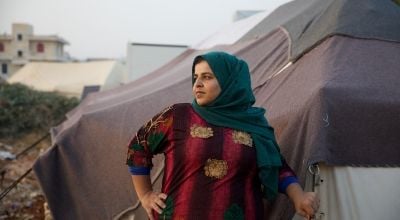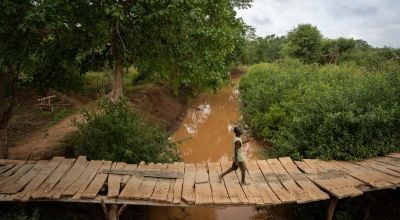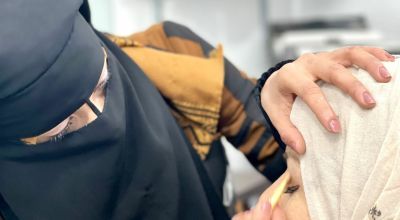
Read our 2024 annual report

Knowledge Hub
Refugees: the faces behind the statistics
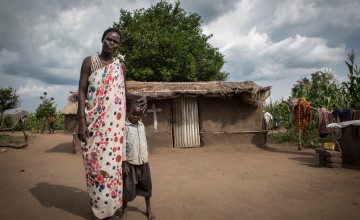
Almost every day we hear reports of families fleeing their homes in an attempt to escape conflict and brutality. Each report begins to merge with the next, until stories start to lose meaning and blur into faceless statistics. But it's important to remember that there are real people behind these numbers - here are some of their stories.
The number of refugees worldwide has now hit a record high. Almost 20 million refugees have been displaced due to war, persecution or human rights abuses. Millions of people travel across land and sea, not in search of opportunity, but to escape the horror of conflict. Many people are faced with unimaginable challenges in their journey to safety, but somehow they keep going, clinging to hopes of a brighter future.
Who is a refugee?
Refugees are people – just like you, just like me. They are parents, siblings, grandparents and friends. They are people who may have once lived carefree lives – just like you, just like me. Some are families whose ordinary lives were turned upside-down overnight. They are individuals with ambitions, hopes for the future and dreams – just like you, just like me. Here are some of their many diverse stories.
Ayen Duot - Adjumani, Uganda
“You have to do all you can to protect yourself, to remain alive. That’s why I fled to Uganda.”
On a spring day two years ago, Ayen and her seven children were forced to flee Bor, the capital of Jonglei State in South Sudan, because of escalating conflict and violence. Without time to pack a bag, Ayen gathered her seven children and embarked on a journey of 500km to Adjumani in northern Uganda by foot.
“The journey was full of hardship…We weren’t prepared for the war. There was no time to get ready,” said Ayen.
The family walked for over a month before they reached safety. They slept in the bush with no shelter and had no food to sustain their increasingly feeble bodies. Ayen was pregnant with her youngest child at the time and feared for her own survival.
“I thought I wouldn’t survive,” said Ayen, struggling to recall the traumatic journey. “I was convinced that I would die on the way because of all the difficulties. I was pregnant and didn’t have any food.”
Eventually the family reached Mongula in northern Uganda, where they are now living in a refugee settlement. Ayen’s husband, sister and brother however, are still living in South Sudan and she has no way to communicate with them.
The future for Ayen and her eight children is uncertain and the road ahead is frightening. But one thing is certain, Ayen desperately wants to return to her husband, her home and her old life:
“We are praying to God for the situation in our country to calm down, so that we can return. That’s my prayer – to go back home.”
Rabia* – Tripoli, Lebanon
Despite a series of heartbreaking blows that truly tested her limits, Syrian refugee Rabia somehow keeps on going.
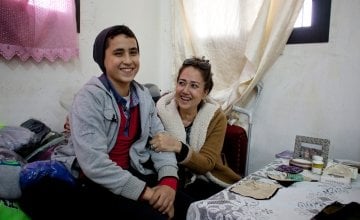
Rabia has spent most of her life living in Syria with her husband and two sons, aged 13 and 17. Almost two years ago Rabia was dealt a heartbreaking cancer diagnosis, and soon after, her husband left her.
Rabia continued her life as best she could and began receiving treatment, but as the conflict escalated in Syria, hospitals became targets. Rabia was forced to leave the country along with her youngest son, to seek treatment in Lebanon:
“I was getting good treatment in Syria. But the war stopped all that. The hospital where I was being seen was hit by missiles. So many doctors have fled Syria.”
Rabia now lives with her youngest son in Lebanon. She receives treatment there but struggles to cover her medical expenses. She constantly worries about both her sons – especially her oldest son who still lives in war-torn Syria.
“I just wish I could gather my sons around me,” says Rabia, her eyes filling with tears. “This week, we heard that my oldest son’s school in Syria had been bombed. When he called to tell me he was still alive, I could not stop crying. I just don’t know what to do. I long for us to be together.”
The five-year Syrian war has taken a clear toll on Rabia, but despite the suffering and hardship, she manages to gather the strength to keep on going.
Rabia attends a daily embroidery workshop in Al-Baqqa, Tripoli aimed to empower female refugees, and one of her friends from the class recognises her inner strength:
“Every day, we see the real effort it takes her simply to get to the classes as she comes on crutches and struggles to get up the stairs. But she is always laughing and makes light of the pain she’s in. She has been through so much, but she keeps on going.”
*name has been changed
Tarek and Zeinah – Halba, Lebanon
“We had everything we needed – a decent house, good education for our children, excellent health care and a peaceful way of life. We would never have thought it could be so easily destroyed,” recalls Tarek.
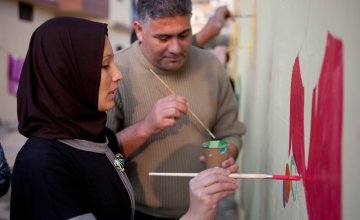
Before fleeing Syria, Tarek was a supervisor in a dairy factory and his wife Zeinah was a primary school teacher. They both earned good salaries and enjoyed a high standard of living. After a fierce bombing raid in their neighbourhood, they were faced with no option but to leave for Lebanon with their three children.
Now they live in a shared apartment with two other families in Halba, Lebanon. Each day is a struggle for the couple, as neither Tarek nor Zeinah have secured work. With no income, basic costs have become crippling for them. They can no longer afford to send their children to school and the fear of becoming homeless looms large.
Tarek expressed feelings of inadequacy and frustration at not being able to provide for his family. But thankfully, he is now taking part in a men’s group which aims to train men in positive coping strategies such as non-violent communication and conflict resolution.
“It’s true, some men have become more aggressive towards women,” Tarek admits. “There is absolutely no excuse, but we know it’s partly due to men losing their jobs, their status as providers, and because of the trauma they’ve been through witnessing terrible things in Syria.”
Tarek’s wife, Zeinah agrees with him, acknowledging that, in her opinion, women go through similar trauma but do not succumb to feelings of anger in the same way as men do.
This consequences of conflict manifest themselves in different ways, but Tarek and Zeinah’s appear united in grief – grief for the life they have left behind. They are frightened, fed-up and they want to go home.
“All we care about is our children and their futures” says Zeinah, staring into the distance. “Our great longing is to return to Syria. When that will be possible? We have no idea.”
The unsung heroes
Refugees are not travelling by choice: they are a fleeing out of necessity. They are running from war, conflict and terror that they have had no role in creating. They are on the frontlines of many long, under reported conflicts. And from our experience, they are the unsung heroes.
Amid protracted struggle and suffering, they are people who show strength, courage and resilience. They endure and survive so much, and ultimately all they want is to return home. Refugees – people just like you – deserve the protection and assistance that they are entitled to under international law.
All case studies mentioned above are involved in programmes supported by Concern Worldwide.
Help support our work with refugees
Read more



